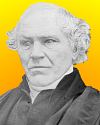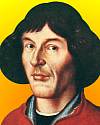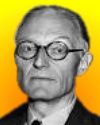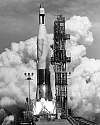 | TODAY IN SCIENCE HISTORY
NEWSLETTER - 24 MAY |
 On 24 May 1883, a new bridge was opened, crossing over the East River, New York City. The celebration was recorded in the New York Times the following day. As you read this article, The Bridge Formally Opened, you will learn of the processions, decorations, addresses, fireworks and illuminations. On 24 May 1883, a new bridge was opened, crossing over the East River, New York City. The celebration was recorded in the New York Times the following day. As you read this article, The Bridge Formally Opened, you will learn of the processions, decorations, addresses, fireworks and illuminations.
|
 On 24 May 1878, Lillian Evelyn Gilbreth was born, an American efficiency expert, who as wife of Frank Bunker Gilbreth, contracting engineer, together developed the method of time-and-motion study. Each step of work activity was to be studied in detail (employing motion pictures for analysis) to determine the optimal way to execute a given task. By choosing a method of least exertion, the employees would be more healthy, more productive, and economically improve the business.To day's Science Store pick is: Making Time: Lillian Moller Gilbreth: A Life Beyond "Cheaper by the Dozen", by Jane Lancaster, who describes Gilbreth's exhausting life of lecturing, travel and endless writing. The author pays a well-documented tribute to her Gilbreth's work and her family life with a dozen children. New $ On 24 May 1878, Lillian Evelyn Gilbreth was born, an American efficiency expert, who as wife of Frank Bunker Gilbreth, contracting engineer, together developed the method of time-and-motion study. Each step of work activity was to be studied in detail (employing motion pictures for analysis) to determine the optimal way to execute a given task. By choosing a method of least exertion, the employees would be more healthy, more productive, and economically improve the business.To day's Science Store pick is: Making Time: Lillian Moller Gilbreth: A Life Beyond "Cheaper by the Dozen", by Jane Lancaster, who describes Gilbreth's exhausting life of lecturing, travel and endless writing. The author pays a well-documented tribute to her Gilbreth's work and her family life with a dozen children. New $27.95, Save 14% Price $23.91. Also available Used from $11.09 (as of time of writing).
Yesterday's pick: The Life and Travels of John Bartram: by Edmund Berkeley Jr. and Dorothy Smith Berkeley.
For picks from earlier newsletters, see the Today in Science Science Store home page. | |
 | "I shall consider this paper an essay in geopoetry. In order not to travel any further into the realm of fantasy than is absolutely necessary I shall hold as closely as possibly to a uniformitarian approach; even so, at least one great catastrophe will be required early in the Earth's history." - Harry Hammond Hess, American geologist (born 24 May 1906)  |
 | "To discover a Conception of the mind which will justly represent a train of observed facts is, in some measure, a process of conjecture, ... and the business of conjecture is commonly conducted by calling up before our minds several suppositions, selecting that one which most agrees with what we know of the observed facts. Hence he who has to discover the laws of nature may have to invent many suppositions before he hits upon the right one; and among the endowments which lead to his success, we must reckon that fertility of invention which ministers to him such imaginary schemes, till at last he finds the one which conforms to the true order of nature."
- William Whewell, English scholar and philosopher (born 24 May 1794)  |

| "Since the discovery of secret things and in the investigation of hidden causes, stronger reasons are obtained from sure experiments and demonstrated arguments than from probable conjectures and the opinions of philosophical speculators of the common sort; therefore to the end that the noble substance of that great loadstone, our common mother (the earth), still quite unknown, and also the forces extraordinary and exalted of this globe may the better be understood, we have decided first to begin with the common stony and ferruginous matter, and magnetic bodies, and the parts of the earth that we may handle and may perceive with the senses; then to proceed with plain magnetic experiments, and to penetrate to the inner parts of the earth."
- William Hunter, English physician and physician (born 24 May 1544)  |
| Before you look at today's web page, see if you can answer some of these questions about the events that happened on this day. Some of the names are very familiar. Others will likely stump you. Tickle your curiosity with these questions, then check your answers on today's web page. |
|  On 24 May 1686, a German physicist and maker of scientific instruments was born. He is known for inventing the alcohol thermometer (1709) and mercury thermometer (1714). He devoted himself to the study of physics and the manufacture of precision meteorological instruments. He discovered, among other things, that water can remain liquid below its freezing point and that the boiling point of liquids varies with atmospheric pressure. On 24 May 1686, a German physicist and maker of scientific instruments was born. He is known for inventing the alcohol thermometer (1709) and mercury thermometer (1714). He devoted himself to the study of physics and the manufacture of precision meteorological instruments. He discovered, among other things, that water can remain liquid below its freezing point and that the boiling point of liquids varies with atmospheric pressure.
 Can you name this scientist? Can you name this scientist? |
 |  William Whewell, born 24 May 1794, was a British scientist, best known for his survey of the scientific method and for creating scientific words. He founded mathematical crystallography and developed Mohr's classification of minerals. He created words that replaced the term natural philosopher by analogy with the word artist. Other useful words were coined to help his friends: biometry for Lubbock; Eocine, Miocene and Pliocene for Lyell; and for Faraday, anode, cathode, diamagnetic, paramagnetic, and ion. William Whewell, born 24 May 1794, was a British scientist, best known for his survey of the scientific method and for creating scientific words. He founded mathematical crystallography and developed Mohr's classification of minerals. He created words that replaced the term natural philosopher by analogy with the word artist. Other useful words were coined to help his friends: biometry for Lubbock; Eocine, Miocene and Pliocene for Lyell; and for Faraday, anode, cathode, diamagnetic, paramagnetic, and ion.
 What words did he devise that replaced the term natural philosopher? What words did he devise that replaced the term natural philosopher? |
 |  A certain Polish astronomer died on 24 May 1543, who had proposed the heliocentric, or "Sun-centred," system whereby the planets orbit about the Sun fixed at the centre. A certain Polish astronomer died on 24 May 1543, who had proposed the heliocentric, or "Sun-centred," system whereby the planets orbit about the Sun fixed at the centre.  Can you name this astronomer? Can you name this astronomer? |

|  Francis Thomas Bacon (1904-1992) was a British engineer who developed the first practical hydrogen-oxygen fuel cells, which convert air and fuel. Francis Thomas Bacon (1904-1992) was a British engineer who developed the first practical hydrogen-oxygen fuel cells, which convert air and fuel.
 What is the useful product of these processes? What is the useful product of these processes? |
 |  On 24 May 1883, a new bridge was opened, crossing over the East River, New York City, USA. On 24 May 1883, a new bridge was opened, crossing over the East River, New York City, USA.
 What is this bridge called? |
 |  On 24 May of a certain year, the first successful American surveillance satellite, Midas II, was launched from Cape Canaveral, Fla. into an orbit that circled the earth every 94 minutes. On 24 May of a certain year, the first successful American surveillance satellite, Midas II, was launched from Cape Canaveral, Fla. into an orbit that circled the earth every 94 minutes.
 In what decade was this satellite launched? |
 |  In 1862, a new bridge was opened over the River Thames, London, England. In 1862, a new bridge was opened over the River Thames, London, England.
What is this bridge called?
|
When you have your answers ready to all the questions above, you'll find all the information to check them, and more, on the May 24 web page of Today in Science History. Or, try this link first for just the brief answers.
Fast answers for the previous newsletter for May 23: principles for defining genera and species of organisms; transistor; neon lights; klystron; bifocals; the decade including the year 1962; sore throat.
|
 If you enjoy this newsletter, the website, or wish to offer encouragement or ideas, please send feedback by using your mail reader Reply button. If you enjoy this newsletter, the website, or wish to offer encouragement or ideas, please send feedback by using your mail reader Reply button. |
--
If you do not want to receive any more newsletters,
Unsubscribe To update your preferences and to unsubscribe visit
this link 


 On 24 May 1883, a new bridge was opened, crossing over the East River, New York City. The celebration was recorded in the New York Times the following day. As you read this article, The Bridge Formally Opened, you will learn of the processions, decorations, addresses, fireworks and illuminations.
On 24 May 1883, a new bridge was opened, crossing over the East River, New York City. The celebration was recorded in the New York Times the following day. As you read this article, The Bridge Formally Opened, you will learn of the processions, decorations, addresses, fireworks and illuminations.


 On 24 May 1686, a German physicist and maker of scientific instruments was born. He is known for inventing the alcohol thermometer (1709) and mercury thermometer (1714). He devoted himself to the study of physics and the manufacture of precision meteorological instruments. He discovered, among other things, that water can remain liquid below its freezing point and that the boiling point of liquids varies with atmospheric pressure.
On 24 May 1686, a German physicist and maker of scientific instruments was born. He is known for inventing the alcohol thermometer (1709) and mercury thermometer (1714). He devoted himself to the study of physics and the manufacture of precision meteorological instruments. He discovered, among other things, that water can remain liquid below its freezing point and that the boiling point of liquids varies with atmospheric pressure. Can you name this scientist?
Can you name this scientist?
 William Whewell, born 24 May 1794, was a British scientist, best known for his survey of the scientific method and for creating scientific words. He founded mathematical crystallography and developed Mohr's classification of minerals. He created words that replaced the term natural philosopher by analogy with the word artist. Other useful words were coined to help his friends: biometry for Lubbock; Eocine, Miocene and Pliocene for Lyell; and for Faraday, anode, cathode, diamagnetic, paramagnetic, and ion.
William Whewell, born 24 May 1794, was a British scientist, best known for his survey of the scientific method and for creating scientific words. He founded mathematical crystallography and developed Mohr's classification of minerals. He created words that replaced the term natural philosopher by analogy with the word artist. Other useful words were coined to help his friends: biometry for Lubbock; Eocine, Miocene and Pliocene for Lyell; and for Faraday, anode, cathode, diamagnetic, paramagnetic, and ion. What words did he devise that replaced the term natural philosopher?
What words did he devise that replaced the term natural philosopher?
 A certain Polish astronomer died on 24 May 1543, who had proposed the heliocentric, or "Sun-centred," system whereby the planets orbit about the Sun fixed at the centre.
A certain Polish astronomer died on 24 May 1543, who had proposed the heliocentric, or "Sun-centred," system whereby the planets orbit about the Sun fixed at the centre.  Can you name this astronomer?
Can you name this astronomer? 
 Francis Thomas Bacon (1904-1992) was a British engineer who developed the first practical hydrogen-oxygen fuel cells, which convert air and fuel.
Francis Thomas Bacon (1904-1992) was a British engineer who developed the first practical hydrogen-oxygen fuel cells, which convert air and fuel. What is the useful product of these processes?
What is the useful product of these processes? 
 On 24 May 1883, a new bridge was opened, crossing over the East River, New York City, USA.
On 24 May 1883, a new bridge was opened, crossing over the East River, New York City, USA. What is this bridge called?
What is this bridge called?
 On 24 May of a certain year, the first successful American surveillance satellite, Midas II, was launched from Cape Canaveral, Fla. into an orbit that circled the earth every 94 minutes.
On 24 May of a certain year, the first successful American surveillance satellite, Midas II, was launched from Cape Canaveral, Fla. into an orbit that circled the earth every 94 minutes. In what decade was this satellite launched?
In what decade was this satellite launched?
 In 1862, a new bridge was opened over the River Thames, London, England.
In 1862, a new bridge was opened over the River Thames, London, England. If you enjoy this newsletter, the website, or wish to offer encouragement or ideas, please send feedback by using your mail reader Reply button.
If you enjoy this newsletter, the website, or wish to offer encouragement or ideas, please send feedback by using your mail reader Reply button. 

Δεν υπάρχουν σχόλια:
Δημοσίευση σχολίου